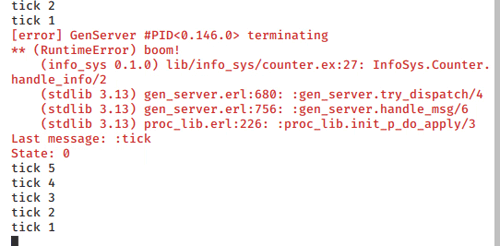Coding the happy path
This week I am working through the last few chapters of Programming Phoenix >= 1.4 by Chris McCord, Bruce Tate, and José Valim. And I wanted to write down one of the really awesome things I like about Elixir – how it supports coding for the happy path.
“Let it crash”
There is a saying with Erlang and Elixir, “Let it crash.” This is because crashing in a running Elixir application (running on the BEAM VM) isn’t quite like crashing out of your Java, C, or Rust app. This is for two reasons:
- When a
BEAMprocess crashes, it often doesn’t bring down the whole application becauseBEAMprocesses are not kernel processes. They are a lightweight abstraction provided by the virtual machine. - In
Elixir, the Supervisor pattern is able to bring your system back up to a known good state.

The application supervisor restarts our crashed ticking processes auto-magically!
Let’s look at some code:
defmodule MyApp.TickingTimeBomb do
use GenServer, restart: :permanent
# Public interface
def start_link(initial_val) do
GenServer.start_link(__MODULE__, initial_val)
end
def init(initial) do
Process.send_after(self(), :tick, 1000)
{:ok, initial}
end
# GenServer Callbacks
def handle_info(:tick, val) when val <= 0, do: raise("boom!")
def handle_info(:tick, val) do
IO.puts("tick #{val}")
Process.send_after(self(), :tick, 1000)
{:noreply, val - 1}
end
end
So here is a very simple GenServer example that ticks down and crashes. In Elixir, A GenServer provides an interface for an agent in a distributed system. An agent is a process, and all processes are able to send and receive messages. Our process is initialized with the init/1 function, setting the agent’s state to the initial value. This could be anything, but for our purposes it is just an integer.
During the initialization a message loop is started by Process.send_after(self(), :tick, 1000). This sends the message :tick to itself after 1000ms. The callback functions then define the behavior of the agent processes. If the tick message is received with the value is <= 0, then the process crashes with an error. Otherwise, it decrements the value and sends another :tick message to itself.
Shouldn’t this only run once?
Well yes, if it werent for our handy declaration at the top of the file
defmodule MyApp.TickingTimeBomb do
use GenServer, restart: :permanent
# ....
This provides the application with a directive to restart the process indefinitely. But our application needs to be told to start our process to get the ball rolling. There are a couple ways to do this, but for the process to run under the application supervisor directly we can add this modele to our application.ex code:
defmodule MyApp.Application do
@moduledoc false
use Application
def start(_type, _args) do
children = [
{MyApp.TickingTimeBomb, 5} # <-- This is the magic here
]
opts = [strategy: :one_for_one, name: MyApp.Supervisor]
Supervisor.start_link(children, opts)
end
end
We add the module as a child process to our application’s supervisor. The second tuple element is the argument that is passed along to our init/1 function whenever it is started. So when it crashes, it is restarted with a value of 5.
This is a pretty neat feature of Elixir programming!
Coding the happy path
So how do we bring this back to the title? Well, it just reinforces that in elixir we can code assertively for the normative case with the guarantee that a raised error will not bring down our application and it remains able to service requests.
So rather than trying to handle every possible outcome of every function call, you can state your expected return, and if the result doesn’t match or fit our contract, then we delegate the responsibility to a supervisor to deal with it. Jose Valim (formerly of Plataformatec, now Dashbit) wrote about this a few years ago.